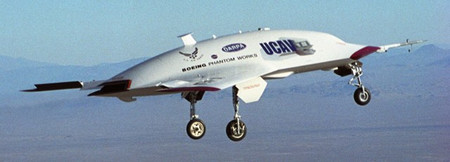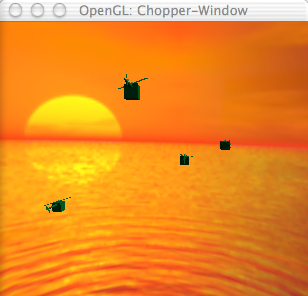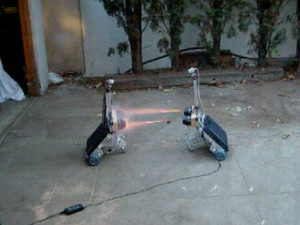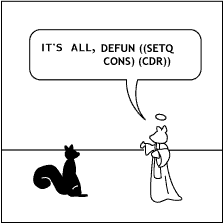December 23, 2002
CL-PPCRE
Someone asked me when I was going to post something again, and I was like "post something where? Oh yeah!"
Tomorrow I leave for a week in Chicago. It's not the stereotypical sunny holiday destination, but I'm sure looking forward to it. Some things you'll see once I get back:
- My Beautiful Commute
- Return of the Lissajous
- 3D in MCL
- Music of 2002
- Porn and CES
OK. Maybe just one thing before I go.
On a bet, Edi Weitz wrote a regular expression engine in lisp (CL-PPCRE) that outperforms Perl's RE engine.
It's portable (tested on 10 lisp implementations--wow, there are actually 10 major ANSI lisp implementations these days) and "It is compatible with Perl. It even correctly parses and applies Jeffrey Friedl's famous 6600-byte long RFC822 address pattern."
December 18, 2002
DARPA Grand Challenge
DARPA is sponsoring an autonomous ground vehicle race in 2004 from L.A. to Vegas [via Paul Snively].
It's like The Cannonball Run, only with robots. And no Jackie Chan. But I hear Burt Reynolds is on board.
December 17, 2002
MCL Resources
Stonewall Ballard posted a nice plst resource for MCL 5.0b.
The resource lets you drag .lisp files to the MCL icon in the dock, and to double click on .lisp files to open them with MCL.
It also will take advantage of Takehiko Abe's 128x128 MCL icon resource.
December 16, 2002
Outage
A big rainstorm came through LA today. Apparently it knocked out my power for a while, and my DSL modem woke up confused. And stayed confused until I got home and knocked some sense into it, almost nine hours later.
December 14, 2002
Fresh Meat
Frank Adrian has released version 1.3 of his unit testing tool, CLUnit.
Marc Battyani is looking for beta testers for CL-PDF 1.0, his PDF generation library. It looks like he's added a lot to it since the last release.
Version 2.0 of David E. Young's LISA production rule system has been released.
ECL 0.8, the lisp implementation that compiles to C but is not GCL, is now available, and has what looks like a lot of bug fixes and new features.
December 12, 2002
UCAV #2
A second X-45A Unmanned Combat Air Vehicle (UCAV) made its first flight from Edwards Air Force Base recently.

It was also a test of Build 2.0 of the UCAV control software, which includes greater autonomy, the ability for human controllers to command multiple vehicles simultaneously, and "point-click-kill" capability.
December 09, 2002
Hand Made
Daniel Weinreb on Symbolics' decision to buy instead of build the keys for their keyboards:
We made our own monitor electronics, our own laser-printer electronics, we wrote the microcode, we wrote the operating system, and so on, but making our own keys was, finally, below the level of abstraction that demarked our build/buy line. We were really, really crazy, but we were not really, really, really, really crazy.
Troutgirl: "I worry a lot about whether handwork has lost all value in the modern age."
Sonic Satanism
I love WFMU.
I listen almost every day, but the best part is Thursday night's Advanced D & D show with DJ Donna Summer, described as "Breakcore, electro-acoustics, death metal, dirty 70's disco, raw satanism." Which has zero overlap with the music I like, and yet... I can't get enough of it. It makes my brain hurt, but in a good way. The most recent show made me decide I had to buy some Norwegian death metal, which isn't something I do every day.
The Nov. 8 show was a really good one. And for your convenience, since so many people have a problem with Real Media files, (WFMU broadcasts a 128kb MP3 stream, but all the archives are in Real Media format), I even have an mp3 that a friend captured from the live stream that you may listen to.
December 08, 2002
New OpenGL Bindings for MCL
Alexander Repenning has released a new version of his OpenGL bindings for MCL 5.0 beta.

December 07, 2002
New NFS and FTP Servers From Franz
Franz has released new versions of their open source FTP server and NFS server.
December 05, 2002
Solving Memory Leaks
More news from comp.lang.lisp.
Garbage collection means no more crashes because you confused the hell out of malloc/free/new/delete by freeing something that you shouldn't have. In fact, there's no freeing at all. But, as most of the world learned when they started using Java, GC doesn't necessarily put an end to memory leaks. In C/C++, I use valgrind to debug memory leaks. But what tools are available in lisp?
Lois Wolf reveals some ACL magic for figuring out what's keeping your objects from being reclaimed.
Then Eric Marsden does the same for CMUCL.
December 04, 2002
CL-BibTeX
More from comp.lang.lisp.
Matthias Köppe has released version 0.2 of CL-BibTeX, the lisp replacement for BibTeX.
Lisp Critic
I'm clearing my queue of stuff seen on comp.lang.lisp recently.
Chris Riesbeck's lisp critic (source is available):
? (critique
(defun count-a (lst)
(setq n 0)
(dolist (x lst)
(if (equal x 'a)
(setq n (+ n 1))))
n))
++++++++++
SETS-GLOBALS: GLOBALS!! Don't use global variables,
i.e., N N
++++++++++
DOLIST-SETF: Don't use SETQ inside DOLIST to accumulate
values for N. Use DO. Make N a DO variable and don't
use SETQ etc at all.
++++++++++
USE-EQL: Unless something special is going on, use EQL,
not EQUAL.
++++++++++
X-PLUS-1: Don't use (+ N 1), use (1+ N) for its value or
(INCF N) to change N, whichever is appropriate here.
++++++++++
(Chris Riesbeck was Will Fitzgerald's thesis advisor; Will is the guy I have to thank for hiring me at two different companies to do Lisp.)
December 02, 2002
December 01, 2002
More ER1 Publicity
Evolution was on slashdot again, after the Associated Press syndicated a review of the ER1.
It's slashdot, of course, but I don't think I saw more than one or two comments containing 100% accurate or insightful information. The two most significant things that seemed to be missed by the slashdotters are
- Evolution has a linux version of the software.
- Computer vision is not easy.
While it's true that at the moment you can't buy an ER1 and have it work with your linux system, nobody even noticed that we have been selling a linux version of our software for some time [actually it looks like the next day someone did finally mention this]. In fact the linux version predates the Windows port by many months.
I love the poster who said you'd save a lot of money if you just bought a bunch of resistors and diodes and put it together yourself. Well, yeah, I guess. If you ignore the issue of software to run the thing. The Evolution Robotics Software Platform (ERSP) is a nice, powerful, portable robot programming architecture, and it took a lot of effort to develop it. And not just in terms of time; I will go out on a limb and say that no hobbyist is going to have the ability required to code up object recognition with the same performance that ERSP already has. But hey, "it's just software".
The ER1 certainly has faults. It's a complex product, and Evo tried to pack in as much as it could and still keep the price reasonable, which involved all sorts of tradeoffs. It is cool that as the control software has been improved it has been made available for free on the Evo website.

Here are two things that slashdotters might have found entertaining:
- The videos of ER1s with mounted model rocket launchers using vision to detect and fire at other ER1s
- The video of an ER1 reenacting a scene from the battle for Hoth, circling an R2D2 robot at high speed, entangling it in a cable, then dragging the poor complaining R2 unit around the room.

